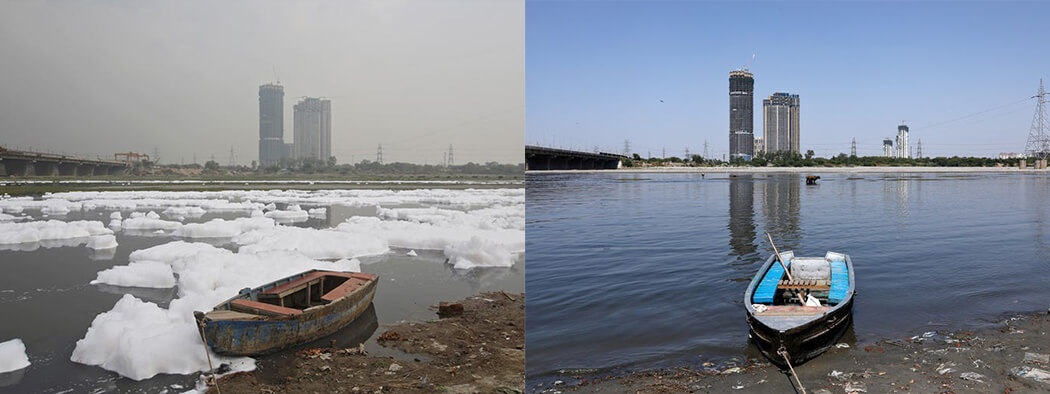Table of Contents
Action on Climate Change
The coronavirus pandemic and global lockdowns have caused a reduction in carbon emissions, cleaner air and re-emerging wildlife, offering a glimpse into an alternative future should drastic action on climate change be taken following the crisis.
The coronavirus pandemic ,A silver lining
The coronavirus pandemic and strict lockdowns that followed have grounded almost all flights, significantly limited the amount of people commuting to and from workplaces and drastically reduced the amount of traffic on roads.
A 6% drop in carbon emissions has already been recorded but the head of the World Meteorological Organization has warned that this is only “short-term good news.”
Cleaner air in cities across the word
Residents in cities like Delhi, Bangkok, Beijing and Bogotá, where varying coronavirus restrictions have been imposed, have all reported a significant decline in air pollution. The World Health Organisation (WHO) air quality guidelines assert that any air quality index (AQI) readings above 25 are unsafe. Day to day in Delhi, the AQI reading could be anything between 200 and 900, so residents have been shocked to see recent AQI readings around 20.
Back to nature
Previously the epicentre of the coronavirus pandemic, Italy enforced some of the strictest lockdown measures. This has led to images of wildlife returning to usually populated areas being shared across social media. The decrease in boat traffic on the canals of Venice for instance, means the water is undisturbed, making them appear much clearer, and has resulted in seaweed, fish and even jellyfish being spotted in the city’s waterways.
<iframe src=”https://www.facebook.com/plugins/video.php?href=https%3A%2F%2Fwww.facebook.com%2FABCNews%2Fvideos%2F1929832650481849%2F&show_text=1&width=476″ width=”476″ height=”606″ style=”border:none;overflow:hidden” scrolling=”no” frameborder=”0″ allowTransparency=”true” allow=”encrypted-media” allowFullScreen=”true”></iframe>
Meanwhile in the UK, a group of mountain goats have taken advantage of the lockdown by seizing the Welsh town of Llandudno, as documented in a series of social media posts. While the goats are regular visitors to the town, residents agree the lockdown has caused them to venture further.
However, National Geographic have warned that some of the hopeful stories of wildlife thriving during lockdown are fake or exaggerated and that there is harm in spreading false hope during times of crisis.
Two crises
The advent COVID-19 has gripped the world and dominated news outlets, pushing almost all other issues to the side-lines. The devastating bushfires in Australia that were still burning when coronavirus started to spread throughout central China seems like part of a previous era and action on climate change no longer feels like a priority. But while the lockdowns are providing us with a glimpse of what life could be likes with less pollution, it is also shedding light on the dramatic scale of the climate crisis.
In his message for International Mother Earth Day this year (Wednesday 22nd April 2020), UN Secretary-General António Guterres acknowledged the “loss, suffering, and unprecedented challenges” we face as a result of the coronavirus pandemic, but highlighted “another, deep emergency — the planet’s unfolding environmental crisis.”
“We need to turn the recovery into a real opportunity to do things right for the future.” – UN Secretary-General’s Message on International Mother Earth Day 2020
Guterres suggested six climate related actions to shape the recovery strategy including ensuring green jobs and sustainable growth as businesses return to normal, a shift from grey to green economy, and incorporating climate risks and opportunities into financial systems.
In the 50 years that have passed since the first Earth Day in 1970, we’ve seen the physical impact of climate change, from rapidly melting ice caps to ravenous wildfires. Now, as the world is forced into lockdown, we see a glimmer of hope in the clear canals of Venice and in the fresh air of Delhi. But governments, businesses and individuals alike have to take a new approach and action on climate change must be intertwined with the world’s recovery strategies coming out of the coronavirus pandemic.
Follow HAD on Facebook, LinkedIn, Twitter and Instagram
Written by Romey Watters
Digital Marketing Officer








